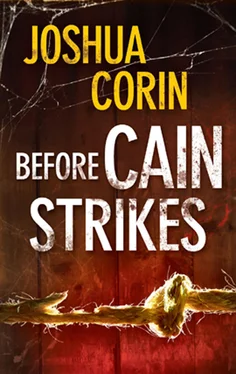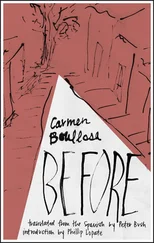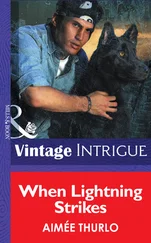Praise for Joshua Corin’s debut novel WHILE GALILEO PREYS
“I never understood what spine-tingling meant until I read this book.”
—San Francisco Book Review
“Joshua Corin is a new name to watch in crime fiction. Fearless, inventive and intuitive, his writing is incredibly self-assured.”
—J.T. Ellison, bestselling author of The Cold Room
“Enjoyable thriller [with] faultless action scenes.”
—Publishers Weekly
“Corin has created a quirky, savvy profiler in Esme Stuart and a first-rate antagonist in the sniper. Readers are going to hope Corin has a whole series of books planned for Esme.”
—RT Book Reviews
“For suspense/thriller fans like me, author Joshua Corin is a dream come true. The intensity levels were insanely high throughout this book from beginning to end. I couldn’t get enough.”
—Manic Readers
“An excellent, bone-chilling tale. The plot is tightly woven, and the action doesn’t stop until the last page. I look forward to seeing more of Mr. Corin’s work. This is a must read.”
—Romance Reviews Today
Before Cain Strikes
Joshua Corin

www.mirabooks.co.uk
To my niece Abby (for when she is much, much, much older)
Prologue
Chapter 1
Chapter 2
Chapter 3
Chapter 4
Chapter 5
Chapter 6
Chapter 7
Chapter 8
Chapter 9
Chapter 10
Chapter 11
Chapter 12
Chapter 13
Chapter 14
Chapter 15
Chapter 16
Chapter 17
Chapter 18
Chapter 19
Chapter 20
Chapter 21
Chapter 22
Chapter 23
Chapter 24
Chapter 25
Chapter 26
Chapter 27
Chapter 28
Chapter 29
Chapter 30
Acknowledgments
We are a nation of outlaws. It’s in our history.
It’s in our blood.
Our first colony in Massachusetts was settled as a sanctuary and refuge for those souls brave enough to defy the Anglican Church. These men and women were the first American heroes and they were rebels one and all. That their ancestors should rise up one hundred and fifty years later and throw off the shackles of British tyranny was inevitable. What was the Civil War, really, but a re-creation of the Revolution from a Southern point of view?
We are not a people who respond well to authority.
Is it any wonder, then, where our sympathies lie? Of course the chroniclers of the Wild West preferred Billy the Kid to Pat Garrett. Of course we all know the legend of Butch Cassidy and the Sundance Kid, but how many of us can mention—or even care about—the Pinkerton detectives who were on their trail?
Look at our literature. Look at our theater. Time and again, our fascination sides with the felon, the ne’er-do-well, the desperado.
By sales alone, who is the most popular American comic book character of the twentieth century? Not that “over-grown Boy Scout” Superman. Not “guilt-ridden” Spider-Man. According to industry experts, the most popular comic book character of the twentieth century was the shadow-dwelling vigilante Batman. Of course he was.
It’s no surprise that we as a nation have become so fascinated by serial killers. As an ever-growing government has euthanized our convictions and emasculated our passions, we recognize in the serial killer a figure of unabashed liberty, and we are attracted.
Let there be no misunderstanding: murder is reprehensible. The thesis of this text will be an analysis of the recent series of murders committed by Henry “Galileo” Booth in the context of the outlaw mystique. If you are looking for a championing of men such as him, look elsewhere. There is a vital line between attraction and acceptance.
John Dillinger is much more appealing from afar.
Nietzsche in Beyond Good and Evil wrote that when we gaze into the abyss, the abyss gazes back into us. Hold my hand. Take a breath. The abyss we are about to study in its dark geography is at the very core of America and its honesty cleanses with acid.
Are you ready?
Let’s begin.
Timothy’s first pet was a yellow-haired hamster named Dwight. Dwight came with his own glass container and his own wheel and Timothy’s parents placed it all on a folding table by a window in Timothy’s bedroom. Timothy was six years old. Dwight was his birthday gift. The next morning, after he and his mother fed Dwight his breakfast (a lettuce leaf), Timothy’s mother left her son alone in his room with the creature. Timothy sat cross-legged in the center of his mint-green carpet and held Dwight in his hands and ran his fingers along the rodent’s spine. The vertebrae reminded Timothy of a pipe cleaner. In nursery school, he built a man and a woman out of pipe cleaners. Timothy bent the hamster’s spine this way and that way. Through it all, the animal kicked and kicked, so Timothy held him firm with his left hand and ran the fingertips of his right hand along the thin yellow fur and the ridges of Dwight’s spine, which, again like a pipe cleaner, was so bendable, but just how bendable was it? Timothy grabbed Dwight’s hindquarters and twisted. Dwight’s feet kicked and kicked and kicked and kicked and then stopped kicking altogether and Timothy had his answer.
He opened the window in his bedroom and tossed the corpse out and told his parents in between sobs that Dwight had fallen. They consoled him. His father, a travel agent, helped Dwight bury the animal and took his son out for ice cream. Three weeks later, his mother, a veterinarian, got him a tabby. Timothy named the cat Boots. Boots, to her credit, lasted many months longer than Dwight, until Timothy was able to finally reach his father’s tools, which were kept on a wall in the garage. Dwight chose the claw hammer, which proved doubly useful because he was able to later use it as a shovel to bury Boots in their neighbor’s yard.
So his parents bought him another cat.
Then another.
Then a puppy.
Then a parakeet.
Then a pair of goldfish in a sealed aquarium.
The goldfish he poisoned with Drano. By then he was nine years old. The goldfish were his last pets for a long, long time.
Until today.
And today was a very special day not only because he had a new pet on a new birthday but because he had acquired her all by himself. No one else knew about her, which was fine by him. Pets were personal. And she was his.
Her name was Lynette. She had yellow hair—much like Dwight, actually—and a pair of eyes so blue they reminded Timothy of wrist veins. His were prominent. He used to wonder if he had the same number of skin layers as everyone else, but a simple dissection with a straight razor (from his dad’s shaving kit) and a microscope (from his old grammar school) solved that mystery.
Lynette’s limbs were meaty. Her whole body was, really. Whoever had owned her before him had fed her well. Catching her had been easy but transporting her had been a challenge. Timothy ended up stuffing her in a heavy-duty duffel bag he bought at an army surplus store and dragging her. No one asked questions. Why would they? By the time he brought her down the wooden steps of the unfinished basement and deposited her in the corner, his heart was pounding a cocaine rhythm and his vision had become misty with exhaustion. He left her zipped in the bag, climbed the stairs to the kitchen and poured himself a tall glass of ice water. That did the trick.
Then he returned to the basement and unzipped the bag. Lynette was still unconscious. Her bare chest—as amorphously plump as the rest of her—languidly crested and troughed. He looked to see if there were any scorch marks on her neck where he had Tasered her. That was when he noticed the dime-size mole at the bend of her left clavicle. He fingered its spongy texture. Hmm. He might have to take her to see a doctor. The mole could be cancerous. He filed that thought in the back of his mind and secured the leather collar around her thick throat and gathered the almost-empty duffel bag from under her and brought it with him to the wooden stairs. He had made it halfway up when Lynette made a noise.
Читать дальше













